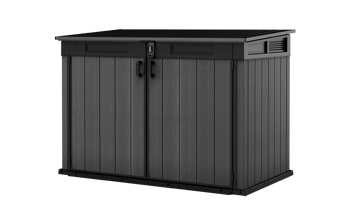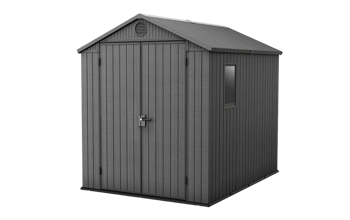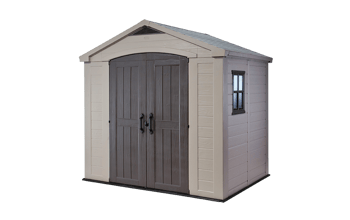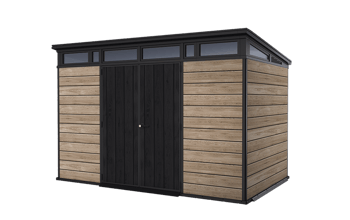
Do You Really Need a Shed Foundation? Pros and Cons for Small, Medium and Large Sheds
Have you ever thought about shed foundations? We get it, it might not be at the top of your list, but if you’re building a shed, it needs to be. Whether you’re planning to build a small garden shed or a large backyard workshop, it's a very important question. In this blog, we’ll talk about shed foundations for small, medium and large sheds, and help you have a better understanding before you build your new shed.
Why Almost Every Shed Needs a Shed Foundation
So, let’s get right to it—do all sheds need a foundation? The most straightforward answer is yes. Why do sheds need foundations, though? Can’t you just build a shed directly on the ground? No—you should not build your shed directly on the ground—even if it has a floor. Sheds need to be built on a firm and flat foundation. This is for a myriad of reasons, but some of the biggest are because a shed foundation does the following:
- Helps prevent moisture damage
- Provides structural support
- Can extend the life of the shed.
There is a misconception that tiny sheds don’t need a foundation. While you can absolutely try to build one of these sheds without a foundation, you’d still be better served to build it on a base. This is such a small group of sheds, though, that we’d say yes to sheds needing foundations.
Foundations for Small Sheds
Small sheds like the Cortina Mega storage shed from Keter are great for storing things like gardening equipment, grilling supplies or even your trash bins. They’re the perfect storage solution for people who maybe don’t have a huge yard, or have very specific small storage needs.
Alright, let’s start with the big question. Do small sheds need bases and why? The short answer: is like we mentioned above, yes, absolutely small sheds need bases. Even though small sheds are more compact, they still need a solid base to protect them and ensure they last. No one wants to spend time and money on something that won’t last. As mentioned above, sheds need a base. While people say sheds that are smaller don’t need them, we’d still recommend a base.
So, why? Well, one of the biggest advantages of a shed foundation for small sheds is moisture protection. Without a proper base, your shed sits directly on the ground, which can lead to moisture getting in—think mold and other gross things that you do not want in your shed. A foundation can also help keep your shed level. Of course, you don’t want everything falling all over the place if the floor is uneven—but did you know that an uneven shed base can also mean your doors and windows may not function properly? A shed foundation for a small shed can have a huge impact on the overall structural integrity.
Foundations for Medium Sheds
Now, let’s talk about medium sheds. These are really important when it comes to backyard storage. Medium sheds like the Darwin 6x8 storage shed from Keter are used for small workshops and for storing patio furniture, seasonal decor or even bikes. Medium sheds are bigger, heavier and usually handle much more demanding storage needs compared to small sheds. So, do they need a shed foundation? You guessed it! Absolutely medium sheds need a foundation.

Here’s the thing—medium sheds aren’t just about size; they’re about function. Whether you’re storing your lawnmower, organizing gardening tools or storing away your holiday lights, stability is a must. Having a solid foundation built under your shed is what prevents sheds from settling unevenly. In turn, this keeps your equipment safe from moisture damage and ensures your shed can handle the weight of its contents.
Foundations for Large Sheds
So, what about large sheds like the Cortina 11x7 from Keter? Well, a solid shed foundation isn’t just a good idea—it’s absolutely essential for large sheds. These sheds often handle heavy tasks like being hobby spaces, storage for riding lawn mowers or even for housing outdoor toys like motorcycles. This means a larger shed needs to be able to handle heavier loads and more extensive use. Without a strong foundation, you risk the shed sinking, shifting or settling unevenly over time, which can cause terrible structural issues.
Consequences of Skipping a Foundation
So, what can happen if you decide to forgo a shed foundation? A lot of work and expense. We’ve talked about it a bit, but without a foundation, you can run into sinking, issues with water and even the disruption of your shed’s functionality. This can result in damage to your shed and even the items stored inside. If you’re taking the time and money to install a shed in your yard, it needs to be done correctly to be worth it.
Choosing the Right Foundation for Your Shed
When selecting the right foundation for your shed, there are several important factors to consider:
- Think about the size and weight of the shed.
- Evaluate the ground conditions.
- Your local weather also plays a role; for example, areas with heavy rain might need a gravel shed foundation that prevents water from collecting underneath.
- Consider how you plan to use the shed.
If you're unsure about what the most common foundation types are, read our blog here. However, if you’re curious which foundation type is best for your shed, it’s a good idea to talk to your shed manufacturer or consult with a professional. They can take a look at your property and give you guidance on the best solution for your shed’s longevity and performance.
While Keter sheds are weather resistant which means they do not crack, rot, rust or peel, you’ll still want to have a shed base. The base offers a flat place for the shed to be and can help the shed function properly and last longer. In the case of Keter sheds too, if you do not have a shed base, you void your warranty.

We build in a sustainable manner.
We use innovative materials and leading technologies to build planet-friendly products that last a lifetime.










.jpg?sw=120)
.jpg?sw=20)




